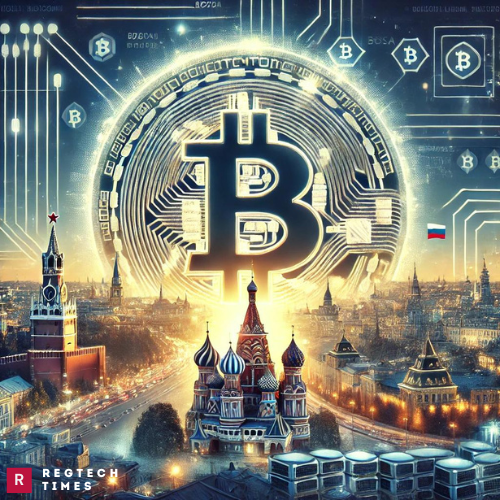In the face of stringent economic sanctions from the West, Russia has turned to an unexpected ally: Bitcoin mining. Over the past year, the country has mined more than $3 billion worth of Bitcoin, using this digital asset not only to bypass economic restrictions but also to bolster its economy. The legalization of Bitcoin mining by the Russian State Duma last July has proven to be a strategic economic masterstroke, offering a lifeline amid growing international pressure.
Legalization of Bitcoin Mining: An Economic Masterstroke
Russia’s decision to legalize Bitcoin mining in July is more than just a legislative move; it is a calculated economic strategy. By legalizing Bitcoin mining, the Russian government allows companies to register as legal entities and benefit from a favorable regulatory framework. This decision is designed to attract massive investments in mining infrastructure from both local and foreign investors, who are eager to take advantage of Russia’s rich energy resources and regulatory clarity.
This initiative is already showing substantial results. In its first year, Bitcoin mining activities have generated around 50 billion rubles (approximately $556 million) in tax revenue for the Russian government. This significant figure demonstrates the potential of Bitcoin mining to serve as a vital economic pillar amid Western sanctions. As more investors are drawn in by Russia’s regulatory stability and potential returns, this revenue is expected to increase even further.
The legalization of Bitcoin mining is part of a broader set of measures aimed at promoting the use of cryptocurrencies for international trade. In the face of economic restrictions imposed by the West, Russia is leveraging digital currencies as a way to circumvent sanctions while stimulating its internal economy.
Circumventing Sanctions Through Bitcoin Mining
Russia’s embrace of cryptocurrencies, particularly Bitcoin mining, is also a strategic maneuver to evade international sanctions. The sanctions imposed by the United States, the European Union, and other Western countries have largely cut Russia off from traditional financial markets. However, cryptocurrencies provide an alternative pathway.
Harsh Sanctions Hit 2 India-Registered Firms Gotik and Pilo for Deceptive Russian LNG Trade
Russian cryptocurrency platforms like Garantex have become key components in this strategy. Since 2018, Garantex has processed nearly $100 billion in transactions, despite being scrutinized by the Office of Foreign Assets Control (OFAC) in the U.S. and the Office of Financial Sanctions Implementation (OFSI) in the U.K. This platform, along with others like Exved, facilitates cross-border trade, enabling Russia to maintain some level of economic exchange despite sanctions.
Observers point out that these platforms are integral to Russia’s economic resilience. Exved, which is linked to the bank InDeFi and co-founded by figures like Sergey Mendeleev, the head of Garantex, and Alexander Lebedev, a former KGB officer, illustrates the complex network Russia has built to bypass financial restrictions through Bitcoin mining and cryptocurrency use.
Towards a Parallel Economy?
Russia’s aggressive adoption of Bitcoin mining and other cryptocurrencies raises important questions about the future of global economic exchanges. By enabling Russia to trade with the world outside traditional financial systems, cryptocurrencies have essentially created a “parallel economy”—one that is less vulnerable to international sanctions and financial oversight.
This parallel economy could shift the balance of global economic power. As Russia demonstrates the potential of Bitcoin mining to evade sanctions and sustain economic activity, other sanctioned countries may follow its lead, turning to digital currencies to safeguard their own economies.
Unveiling Hong Kong’s Key Role in Sanctions Evasion Against Russia
Moreover, Russia’s growing role in the cryptocurrency market could have far-reaching implications for the digital asset ecosystem. By actively participating and investing in Bitcoin mining, Russia may influence global regulations on digital currencies, turning them into powerful geopolitical tools.
Implications for the Future
Russia’s reliance on Bitcoin mining to bypass sanctions represents more than just a financial workaround; it signals a new approach to economic sovereignty in a digital world. By embracing cryptocurrencies, Russia has found a way to mitigate the effects of Western sanctions, asserting its economic independence.
As more countries recognize the potential of Bitcoin mining and cryptocurrencies to evade sanctions and stabilize their economies, the global financial landscape could undergo significant changes. The implications for international relations, economic policy, and regulatory frameworks are profound, suggesting that Bitcoin and other cryptocurrencies will play a growing role in global trade and finance.
Russia’s strategic use of Bitcoin mining is reshaping the global economic landscape. By legalizing and investing in cryptocurrency mining, Russia is building a parallel financial ecosystem that challenges traditional control mechanisms. This move could mark the beginning of a new era where digital currencies become central to global economic strategies.


